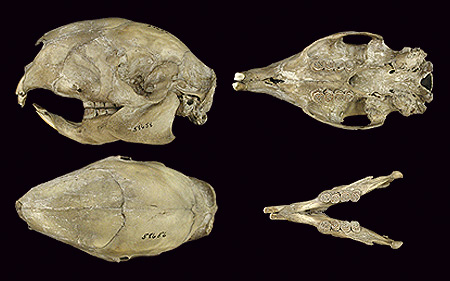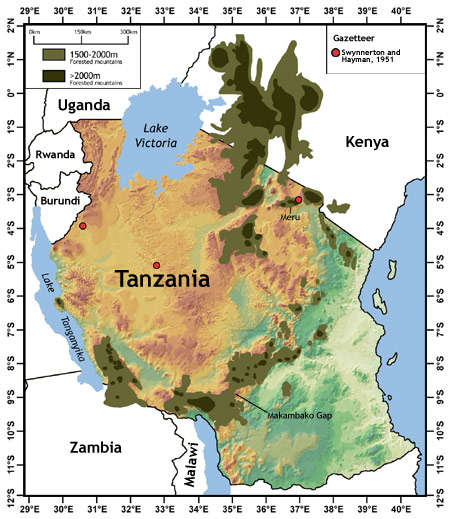- Nyumbani
- Hystrix africaeaustralis
Hystrix africaeaustralis
Order: Rodentia > Family: Hystricidae > Genus: Hystrix > Species: Hystrix africaeaustralis
Common Names: Cape Porcupine [English], Nungu wa Cape [Swahili]

Figure 1. Tanzanian Mammals – Skull of Cape Porcupine (Hystrix cristata), FMNH 58655 Courtesy of: R. A. Banasiak. (c) Field Museum of Natural History. CC BY-NC 4.0. https://mm.fieldmuseum.org/81591add-ec2e-425c-8258-fa6364dc5be8 (accessed on 16 Nov 2025)

Figure 2. Distribution map of Cape Porcupine (Hystrix africaeaustralis) (c) Field Museum of Natural History. https://mm.fieldmuseum.org/b63e4101-f4d9-4a22-a352-470f1a2ff723 (accessed on 16 Nov 2025)
Type Description
Reise nach Mossambique, Saugeth., p. 170.
Type Locality
Mozambique, Querimba coast and Tette, about 10°30' to 12°S, 40°30'E, sea level.
Measurements
Head and body: 750-1000 mm
Tail length: 100-170 mm
Weight: 10-24 kg
Tail length: 100-170 mm
Weight: 10-24 kg
Description
The longer quills on the tail of the South African porcupine help distinguish it from the Crested porcupine.
Distribution
The southern African species, Hystrix africaeaustralis, is found in most habitats from Gabon to Tanzania and down to South Africa up to 3,000 m. (Kingdon, 1984, 1997)

Figure 2. Distribution map of Cape Porcupine (Hystrix africaeaustralis) (c) Field Museum of Natural History. https://mm.fieldmuseum.org/b63e4101-f4d9-4a22-a352-470f1a2ff723 (accessed on 16 Nov 2025)
Key Reference
1. Kingdon, J. 1984. East African mammals: An atlas of evolution in Africa. (Hares and Rodents). University of Chicago Press, Chicago, 2B:687-695.
2. Kingdon, J. 1997. The Kingdon field guide to African mammals, AP Natural World Academic Press, Harcourt Brace & Company, San Diego, p. 187.
3. Nowak, R. M. 1999. Walker's Mammals of the World. Sixth ed. Johns Hopkins University Press, Baltimore, 2:1644-1649.
4. Swynnerton, G. H., and R. W. Hayman. 1951. A checklist of the land mammals of the Tanganyika Territory and the Zanzibar Protectorate. Journal of the East African Natural History Society, 20(6):274-392.
2. Kingdon, J. 1997. The Kingdon field guide to African mammals, AP Natural World Academic Press, Harcourt Brace & Company, San Diego, p. 187.
3. Nowak, R. M. 1999. Walker's Mammals of the World. Sixth ed. Johns Hopkins University Press, Baltimore, 2:1644-1649.
4. Swynnerton, G. H., and R. W. Hayman. 1951. A checklist of the land mammals of the Tanganyika Territory and the Zanzibar Protectorate. Journal of the East African Natural History Society, 20(6):274-392.